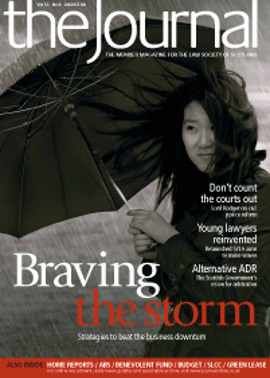Home reports - the practice questions

The recent “Introduction to Home Reports” seminar held by the Law Society of Scotland provided an overview of the Society’s proposed guidelines relating to home reports. Sadly, however, the seminar has, in our eyes, raised a number of secondary questions regarding this ill thought-out idea, which we feel we must raise.
As one of the largest, if not the largest, residential conveyancing firms in Scotland, with a number of branches throughout the North East and Tayside, we very often find ourselves involved in “in-house” transactions, which are of course covered by the existing (conflict of interest) rules.
It is with particular interest, therefore, that we have noted the terms of the Society’s guidelines with regard to conflict of interest matters directly affected by the introduction of home reports.
The guidelines set out three proposals:
1. In the interest of transparency, where firms act for both buyer and seller in terms of the existing conflict rules, they should clarify the source of the home report and any connection which their firm has with the supplier of the report.
We have absolutely no objection to this proposal. Clearly it makes sense that if a firm is producing its own home reports, or directly has connections with a provider of such reports, the public should be aware of this.
2. Where multiple reports have been purchased on behalf of the seller in an effort to obtain a report that portrays the property in the best light, the firm should not represent a purchaser without disclosing the full circumstances, due to the clear conflict of interest between the parties.
Clearly, under the existing conflict of interest rules, the respective solicitors, within the same firm, acting for purchaser and seller should not be sharing information about their clients, which could prejudice either party’s interest. Is it not, therefore, a clear breach of these rules for the selling solicitor to reveal to the purchasing solicitor that his client has obtained multiple reports before settling on one which provides favourable reading for his client? Indeed, is this also not a breach of client confidentiality rules? The very fact of the selling solicitor advising the purchasing solicitor that the purchasing solicitor could not act, even if no explanation is given, would be prejudicial to the seller’s case.
Another issue is where the selling solicitor does not actually know that there have been multiple reports. This could arise from the client obtaining a variety of reports prior to instructing the solicitor, and only providing him with the most favourable, or the property being taken over from another selling agent during the marketing. In the absence of any register of single surveys, the selling solicitor will have no way of knowing with certainty that only one single survey has been carried out.
What if more than one report was carried out for a perfectly genuine and ethical reason, i.e. the report is commissioned and reveals some necessary repairs? The seller has his repairs carried out and then commissions another report. Does this have to be revealed to the purchasing solicitor, and if that solicitor is within the same firm does he have to refuse to act for the purchaser?
More questions
3. Where a purchaser is to be advised to seek an additional independent report in cases where the firm already acts for the seller, the firm should not represent the purchaser due to the clear conflict of interest between the parties.
Why? Is it not good practice for a firm to be advising any purchaser to seek the best information possible regarding the property, and if he is happier relying on a survey provided by a different firm, why should he not be entitled to do so? A further proposal recommends that members should intimate to purchasing clients in writing that they should not rely on reports more than 12 weeks old. What if the home report exceeds this timescale? Does the purchasing solicitor still have to refuse to act?
A further complication with the proposal is that the position of the Council of Mortgage Lenders members is still not totally clear. Our understanding is that they have confirmed they will accept the report if it meets certain criteria, i.e. the surveyor is on their panel, the loan to value ratio is favourable etc. But suppose a solicitor acts for clients purchasing a property from his firm (provided there has not been the need to withdraw from acting in terms of proposal 2!); he submits an offer on behalf of his clients and missives are progressed; whilst this is happening the clients’ mortgage lender advises that the sellers’ report is not acceptable and they require their own report. Under our reading of the terms of the proposal, the purchasing solicitor would have to withdraw from acting.
Hard choices
At the seminar, James Ness also confessed his understanding that there is likely to be general trepidation amongst purchasers and solicitors during the initial period of home reports and it is likely that many purchasers will want their own independent report. Solicitors will then be torn between giving what they believe to be “best advice”, i.e. obtaining an independent report, or having to refuse to act for the client.
It is clear that the proposals have not been thought out in a practical and commercial light. They are restrictive to business practice for any firm which is potentially affected under the conflict of interest guidelines.
We do note, however, that these are, at this stage, only guidelines, and not formal practice rules. As such, we feel obliged to point out that our own firm will not be adhering to these guidelines, and we would invite the remainder of the profession to join with us in this regard.
We are intimating this in the form of an open letter in the hope that we will obtain reaction not only from the Society, but also directly from Society members.
Iain Considine, Conveyancing Partner, Aberdein Considine & Co, Aberdeen and other areas.
What is the guidance?
The Society’s website currently carries a “Consultation on Home Reports Guidance”, a discussion under several heads, of which the conflict of interest issues quoted above are only one, where questions arise in relation to how home reports will work in practice.
The various subjects considered are
- lifespan of reports;
- making reports available to “interested parties”;
- liability for information contained in property questionnaire;
- who can complete the property questionnaire;
- deferred payment arrangements;
- updating reports;
- [property] withdrawn from the market;
- annexation of the home report to offers; and
- conflict of interest.
To access the discussion, go to the Society’s website www.lawscot.org.uk, and select members’ information/ conveyancing essentials/ home reports/home report guidance. The guidance page carries an invitation to respond and an email link for submitting comments.
In this issue
- Where have we come from, where to next?
- Shifting sands
- A rank bad rule
- Braving the storm
- Civil justice: where next?
- Title Conditions Act: new registration procedures
- Young lawyers reborn
- Shining some more light...
- Power to the tribunal?
- Piece by piece
- The poor in our midst
- The Society's future role in complaints handling
- Appreciation: Lord Johnston
- Professional Practice Committee
- Facing the lean years
- It's a web 2.0 world
- Questions, questions
- Bare necessities
- Coming on the blind side
- Relocation, relocation
- Worse than the disease?
- Sleeping bounty
- Scottish Solicitors' Discipline Tribunal
- Website reviews
- Book reviews
- Industry standard
- Meet the committee
- What's in a motto?
- Leasing by example
- Good call?
- Home reports - the practice questions






